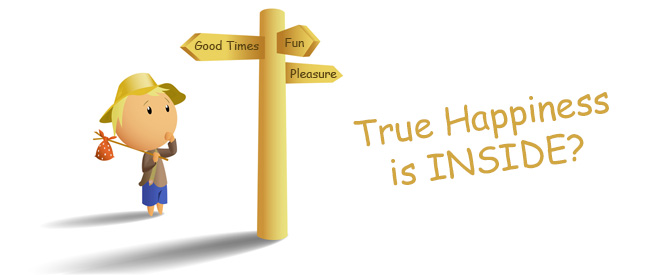Can you be happy without having peace of mind? It’s inconceivable because peace of mind and happiness are not two different things. A happy mind is itself a peaceful mind.
When you say you want to be happy, what you are also implying is that you want peace of mind.
Is there a perfect and reliable path to peace?
The only way we currently know how to gain happiness (and peace of mind) is to find it through fulfilling relationships, and pleasing things and situations that we enjoy.
What we are actually looking for is permanent happiness but because everything changes and is impermanent, we never find it.
Yet we think that getting a perfect partner, a high-paying job or a beautiful home will make us completely happy.
But the fact remains that no person, thing or situation in one aspect of your life can eliminate your feelings of incompleteness in all aspects of your life and make you absolutely happy.
Even as you read this you are probably thinking that it is indeed absurd to think in this way.
And yet strangely, we keep searching for complete happiness in these impermanent things.
We will never find inner peace by looking for it outside. This is because the path to peace goes inward, not outward.
3 wrong notions that take you away from the path to peace
To shift your attention away from the outer world and take it inward, let’s look at three false notions that take you away from the path to peace.*
You think the world is:
- Real
- Separate from you
- The source of joy
According to **Advaita Vedanta, there is one essential Truth or Reality in creation. The entire world of names and forms that we experience is merely an appearance superimposed on this fundamental Reality.
Since this Reality is the substratum of all things and beings, therefore, it is also in you. In fact, it is your true Self.
You are that timeless Reality that is the source of all bliss. Your deepest desire is to rediscover this eternal, blissful Self. But you don’t find it because you have erroneously superimposed happiness on the world and keep searching for it there.
The world on which you superimpose happiness on is neither real nor separate from you. The masters of Vedanta assert this to be so because they have gone within in deep meditation and realized the eternal, changeless, blissfulTruth as their own nature.
When they rediscovered their true Self, the entire world disappeared like an illusion which vanishes once the truth is known. They saw that the Self alone is real and it is this very same Self that appears as the innumerable things and beings of the world.
The happiness or peace we are seeking doesn’t exist in the world; it is only in the Self. But we take the world to be real and something separate from us that can give us the happiness we want. The story of the Princess of Kashi aptly illustrates this.
Does worldly enjoyment lead you to the path of peace?
We have lived countless lives identified with our bodies, taking the world to be real and “out there”, separate from us. And so, it’s hard to understand and even accept what the spiritual masters of Vedanta say.
We are not convinced that there is no happiness or peace in the world because we do experience it. We can’t accept that eternal bliss is possible because no experience in our everyday life validates it.
If you stop to reflect on life and your experiences you may be convinced of what the spiritual masters are saying.
Let’s take a look at some hard facts to see if worldly enjoyment leads to the path to peace.
If happiness is inherent in the objects of the world….
1. The remedy for sorrow would be pretty straightforward—simply go out and get what makes you happy, and that’s that. You’ll never be unhappy or want anything again.
In fact, giving people what they want would be the simple remedy for all sorrow. There would be no unhappiness in the world.
Obviously, it’s not that simple. You can get things that make you happy for some time, but a feeling of incompleteness soon returns, and you start looking for the next thing to fulfill you.
You can’t buy enduring happiness.
2. The same things would make everyone equally happy at all times and under all circumstances.
If happiness was the nature of things like sweetness in sugar or saltiness in seawater, the same things would bring the same experience of happiness to everyone no matter when, where or who tasted them.
But that’s not the case. One person enjoys tea while another prefers coffee. If you offer coffee to the tea lover, or tea to the coffee lover, each will turn you down.
If happiness was the nature of things, having them would make you happy at all times and under all circumstances. But this doesn’t happen. For example, if you love ice cream and I offered it to you when you had a tummy ache or just after you woke up in the morning, you’d surely not want it.
Tea, coffee, and ice cream don’t contain any happiness. We project joy onto these things based on our personal likes and dislikes which are formed from our previous experiences.
3. Having more of an enjoyable thing would bring you more happiness.
If you love chocolate cake and have a second helping, you’d probably feel a little happier.
But your joy doesn’t increase as you increase the number of helpings. For instance, by the time you’ve had your eighth helping, you may be put off by even the thought of cake.
This shows that happiness isn’t in the chocolate cake (or any other thing, for that matter), because more and more of it decreases your happiness.
Even if you had the means to enjoy whatever you desire whenever you wanted it, the pleasures will eventually become “same old, same old”—boring and monotonous.
4. The wealthy would be the happiest people in the world.
We all know that having more material objects and comforts doesn’t insure us against sorrow. The rich and famous living glamorous lives experience unhappiness just like everyone else. In fact, many of them turn to drugs and other addictions, and even take their own lives. (Read: The Four Paths to Happiness)
All these points show that things do not and cannot give us enduring peace.
Proof that peace lies within
Peace or happiness is your true nature. It can be experienced right here and now when the disturbances that hide it are removed.
What are these disturbances? They are mental impurities such as selfish desires, negative thoughts, and emotions. To quiet them and find inner peace, we look to people, things and situations that we like.
To prove to yourself that peace lies within you, think about what happens to your mind when it is stirred up by some desire—the desire to get a new car, for example.
When the desire arises in your mind, you pad it up with more thoughts related to it. For example, you may think about the benefits of a new car, the types of models you will test-drive, the colour and features you want and so on.
As you repeat these thoughts, your desire becomes stronger and stronger. You start to daydream about getting that perfect car. You find it increasingly hard to put these thoughts aside. Until one day, you go to the showroom and buy the car you so passionately wanted.
What happens when you fulfil your desire? You feel happy. This happiness is nothing but the peace that was already in your mind underneath all those agitating thoughts about getting a new car. Once you get the car, your mind becomes quiet and you experience that peace or happiness that was already there.
This proves that real peace is not to be found in the outer world.
The path to peace goes within
Nothing in the world can make you absolutely and permanently happy. You are holding on to the false notions that the world is a real thing existing separate from you, that can bring you the happiness that you seek.
But the world is a changing illusion, and when you carefully reflect on whether things have happiness inherent in them, you will find that they do not.
What you are unconsciously seeking is the rediscovery of your Self, your true nature. Your Self is the very nature of bliss.
It is hidden from you underneath your own mind and can be uncovered when the impurities covering it are removed.
Instead of constantly seeking outside, take the path to peace which leads you within to your own blissful Self.
*Listen to a teacher of Advaita Vedanta talk about the three wrong notions that lead you away from the path to peace
**Advaita Vedanta–the branch of Vedanta that is based on non-dualism and asserts the essential oneness of creation.
***The happy moments that we enjoy in the outer world don’t come from the world but are fleeting glimpses of the bliss of the Self.
Like this post? Sign up for the free fortnightly Spiritual Solutions Newsletter and receive the latest articles, news and updates in your email inbox!













